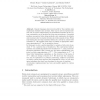Free Online Productivity Tools
i2Speak
i2Symbol
i2OCR
iTex2Img
iWeb2Print
iWeb2Shot
i2Type
iPdf2Split
iPdf2Merge
i2Bopomofo
i2Arabic
i2Style
i2Image
i2PDF
iLatex2Rtf
Sci2ools
110
click to vote
CAV
2001
Springer
2001
Springer
Iterating Transducers
Regular languages have proved useful for the symbolic state exploration of infinite state systems. They can be used to represent infinite sets of system configurations; the transitional semantics of the system consequently can be modeled by finite-state transducers. A standard problem encountered when doing symbolic state exploration for infinite state systems is how to explore all states in a finite amount of time. When representing the one-step transition relation of a system by a finite-state transducer T , this problem boils down to finding an appropriate finitestate representation T ∗ for its transitive closure. In this paper we give a partial algorithm to compute a finite-state transducer T ∗ for a general class of transducers. The construction builds a quotient of an underlying infinite-state transducer T <ω , using a novel behavioural equivalence that is based past and future bisimulations computed on finite approximations of T <ω . The extrapolation to ...
Related Content
| Added | 28 Jul 2010 |
| Updated | 28 Jul 2010 |
| Type | Conference |
| Year | 2001 |
| Where | CAV |
| Authors | Dennis Dams, Yassine Lakhnech, Martin Steffen |
Comments (0)

